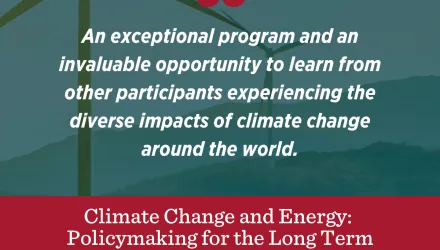The full discussion paper is available for download here: http://belfercenter.ksg.harvard.edu/publication/18649/
OVERVIEW
A global effort to mitigate climate change will require cooperation between developed and developing countries. Even as many developed countries are at some stage of enacting significant domestic regulations to meet global stabilization goals, growth in developing country emissions will easily thwart those goals unless a cooperative solution is found. This paper argues that a wide range of options should be pursued to increase developing-country mitigation efforts over time.
DISCUSSION
Much of the current post-Kyoto policy debate focuses on what role developing countries should play vis-à-vis industrialized countries in terms of reducing global emissions, while achieving sustainable economic growth, and how wealthy nations can best support and encourage mitigation efforts by poor nations. Because climate change is fundamentally a global problem, the participation of all major emitting countries is essential, and developing countries are an important — indeed the most important — source of emissions growth over the next century.
Developing countries typically place greater priority on economic development than on environmental protection, despite being vulnerable to the potential adverse effects of continued warming. Countries like the United States, meanwhile, understand that their own emissionsmitigation efforts can be negated if, through open trade in goods and services, their emitting activities shift to non-participants. This would not only undermine the environmental objective, it would also raise serious jobs and competitiveness concerns.
KEY FINDINGS & RECOMMENDATIONS
This paper identifies three categories of options for increased developing country engagement: domestic policy reforms in developing countries, expanded financing mechanisms to address incremental costs, and diplomatic efforts.
- Domestic policy reforms can produce direct economic, political, and environmental benefits in developing countries while simultaneously contributing toward GHG mitigation. "Win-win" policy opportunities often exist with respect to energy subsidies, energy efficiency, and technology transfer. For example, fossil fuel subsidies are common in many developing countries. Reducing or eliminating them would relieve budget pressures, promote more efficient energy use, improve energy security, and avoid unintended distributional consequences while also slowing the growth of GHG emissions. Similarly, energy efficiency improvements provide multiple benefits and can be encouraged through a variety of mechanisms. Finally, governments can use information, regulation, pricing strategies, investment, and a variety of other levers to promote the more rapid and thorough diffusion of climate-friendly technologies. For their part, developed countries can support climate-friendly domestic policy reforms in developing countries by providing technical assistance and financial support, partnering with relevant agencies, and building human and institutional capacity.
- The scale of investment needed in non-OECD countries to achieve global GHG mitigation objectives necessitates a rethinking of the international financing mechanisms available for transferring resources from developed to developing countries.
- Offset mechanisms have the advantage that they channel private resources to support mitigation efforts in developing countries. The largest existing program of this type is the Clean Development Mechanism (CDM). It has been criticized for providing excessive subsidies, supporting a limited number of project types, and channeling most funds to large developing countries that may have less need of assistance than poorer countries. Two categories of CDM reforms are currently being discussed: (1) adjustments to crediting rules to address the distribution of projects and subsidy levels and (2) moving beyond project-based credits to provide credits for programs, policy reforms, or sectoral targets.
- Public funds have the advantage that they can provide financial support up front (as opposed to only after a project is generating reductions). They also give funders greater control over the amount of subsidy provided to different types of mitigation activities and greater flexibility in terms of how the support is provided (e.g., grants vs. loans vs. loan guarantees). On the other hand, this financing mechanism is subject to budget appropriations by donor governments. Governance is also often contentious, with donors and recipients vying for greater control over the use of international public funds.
- Both of the options already discussed, domestic policy reforms and international financing, are inextricably tied to public and private diplomacy. Financing and other forms of assistance are an important source of leverage in diplomatic efforts. Others include energy security, the threat of trade sanctions, support for adaptation efforts, and broader forms of linkage (for example, Russia ratified the Kyoto Protocol after EU countries agreed to ease Russia's passage into the World Trade Organization). Coordination and cooperation among key institutions is also critical to the success of diplomatic efforts: the United Nations Framework Convention on Climate Change process remains the primary vehicle for international climate diplomacy, but other multi-lateral and regional forums are increasingly also playing a role.
CONCLUSION
Post-Kyoto international climate negotiations are likely to focus on a "grand bargain," with developing countries offering some form of commitments in exchange for further emission reductions and increased financing from developed countries. Developing country commitments could take the form of domestic policy reforms, sectoral targets, or even economy-wide limits. Because no single approach offers a sure path to success, a variety of strategies — including policy reforms, financing approaches, and diplomatic venues — must be pursued simultaneously.
Hall, Daniel S., Michael A. Levi, William A. Pizer and Takahiro Ueno. “Policies for Developing Country Engagement—Summary.” Harvard Project on Climate Agreements, Belfer Center, October 2008



